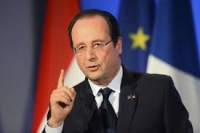French President Promised to Cut Unemployment
Tuesday 19 January, 2016 Written by Nicholas Vinocur
And redeem his reelection chances.
PARIS — François Hollande is in the last-chance saloon.
With a presidential election 17 months away, the deeply unpopular French president on Monday unveiled a plan to start bringing down unemployment before the end of this year — likely his last in office.
It was the latest in a series of measures designed to kickstart job creation, none of which have so far made a dent in the unemployment rate. In southern Europe, France remains the only big European country that has failed to start cutting unemployment meaningfully after the global financial crisis.
But this time the stakes are higher, and the timing leaves no room for error. Hollande has repeatedly vowed that he will not run for re-election unless the jobless rate, which is currently stuck above 10 percent, starts to drop this year.
As left-wing rivals start calling for a party primary to choose their candidate for the 2017 election, the Socialist leader outlined a plan that leaves little to chance, or, some would argue, little chance of actual job creation.
In his speech to trade unions and business leaders, he said the government would herd 500,000 long-term jobseekers into professional training programs this year that should, if all goes well, leave them better prepared to get hired. However, none of those people is likely to end the year with an actual job. Rather they will no longer be technically qualified as “unemployed,” thus bringing about a mechanical, if artificial, drop in the overall jobless rate.
For Hollande, the criticism cuts deep. It brings the media focus squarely back onto his economic track record, a weakness that easily overshadows any recent success.
Hollande tried to deflect criticism of the plan, arguing in his speech that it was “not statistical artifice.” Opponents fired back that it was exactly that: a three-card trick to make it look as though unemployment was falling.
“Hollande’s magic tricks,” read a headline in Le Point magazine. “The president’s sleight of hand on job training,” said business magazine Challenges.
For Hollande, the criticism cuts deep. It brings the media focus squarely back onto his economic track record, a weakness that easily overshadows any recent success, from hosting the COP21 climate conference to his handling of the aftermath of the November 13 terrorist attacks in Paris. Voters are increasingly wary of government sales pitches, because so many previous “reforms” have had no real impact on their lives.
“Hollande is now forced to act with very narrow margins,” Yves-Marie Cann of the Elabe polling agency said. “The problem is, what he is selling as a reform looks like a small repair, an attempt to paper over reality using an old solution.”
Government sources say that Hollande wants to pick his battles in the last months of his presidency. Since his plan to revise the Constitution is likely to draw fierce opposition from the left flank of his own Socialist party, the president wants to avoid opening a second major front on the economy. That is what would have happened had he opted for a more radical solution on the job front — even though polls show a majority of French people favor more far-reaching measures to stimulate the job market.
No sacred cow is more revered than France’s legally mandated working week, written into law by a previous Socialist government.
Those measures were not unknown; they are reforms that employers, bankers and even some trade unions have sought for years. Here’s a short list of the moves that Hollande has ruled out.
Increasing the 35-hour workweek
No sacred cow is more revered than France’s legally mandated working week, written into law by a previous Socialist government. Hollande made it clear in his speech that he would not touch the 35-hour rule, though he gave firms more leeway to negotiate opt-outs with trade unions. To be fair, his predecessor Nicolas Sarkozy also chose not to mess with the 35-hour rule. “Political interests mean there is no will to question certain political totems, for the Right or the Left,” said Cann.
Creating a more flexible job contract
The long-term “CDI” job contract also has totem status in French society. It offers top-notch job security to people lucky enough to have one, while locking everyone else out in a binary arrangement that many economists call the “insider-outsider” system. Yet Hollande has promised to preserve it, rejecting calls to create a new contract that would erase the difference between the CDD contract, which is short and flimsy, and the ironclad CDI.
Removing the ’50-worker’ threshold
In France, any firm that hires its 50th worker suddenly has to respect a broad set of regulations, including setting up rooms for works councils to meet and setting aside time for those meetings. The result is an abnormally high number of companies with 49 workers. While the government pledged to address the problem, which limited company growth, the measure was abandoned after trade unions and employers failed to agree on how to go about it.
+++
François Gérard Georges Nicolas Hollande (French pronunciation: [fʁɑ̃swa ɔlɑ̃d]; born 12 August 1954) is a French politician who has been the President of France since 2012. Hollande was previously the First Secretary of the French Socialist Party from 1997 to 2008, the Mayor of Tulle from 2001 to 2008 and the President of the Corrèze General Council from 2008 to 2012. He also served in the National Assembly twice as the Member for Corrèze's 1st Constituency from 1988 to 1993 and again from 1997 to 2012.
Source Wikipedia
Leave a comment
Make sure you enter all the required information, indicated by an asterisk (*). HTML code is not allowed.
Join
FREE
Here










